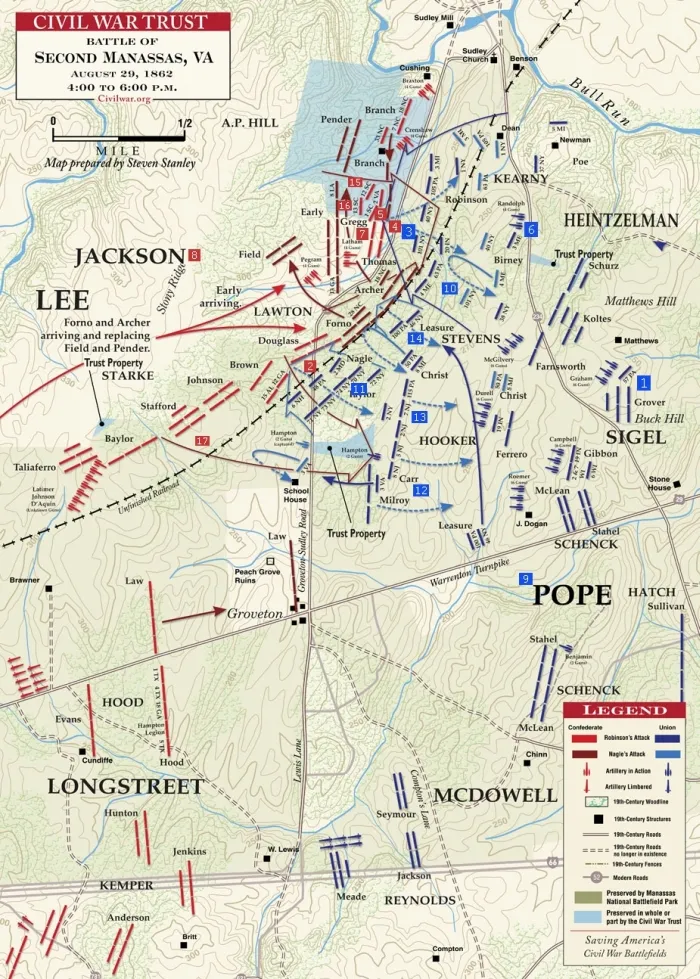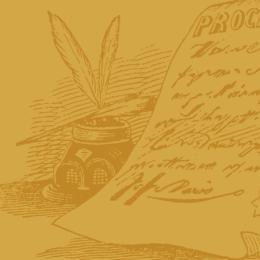Moments in Time: The Battle of Second Manassas - The Railroad Cut, Part 2


The afternoon of August 29, 1862
The battle continued to seethe along a two-mile line as morning slipped into afternoon. The Confederates held their ground as Pope formulated a plan of attack. While he deliberated, James Longstreet marched. Unbeknownst to Pope, the Right Wing of the Confederate army was fast approaching to join Stonewall Jackson on the battlefield.
1. “What does the general want me to do now?” – Brigadier General Cuvier Grover (USA)
Days of confused plans and long counter-marches had worn nerves thin throughout Pope’s army. Cuvier Grover greeted an aide bearing new orders with a burst of anger. Hearing what the general wanted him to do—move through the Groveton Woods and charge the railroad cut unsupported—did little to soothe Grover’s temper. He moved his 1,500 men forward at three PM.
2. “They came hurrahing and huzzahing as if they thought that would cause a panic among us.” – William McLendon, Douglass’s Brigade (CSA)
The railroad cut was a natural fortification, an excavation that had left high banks of earth and stone for the Confederates to use as breastworks. The Dump, however, was a wide, muddy gap in the line without any cover: a glaring weak spot in an otherwise ideal defensive position. As Grover started his advance on the other side of the field, three regiments from Maryland, New Hampshire, and Pennsylvania renewed the attack on this point, hoping to succeed where General Milroy had failed. With Confederate muskets sweeping their advance, they managed to force their way through the gap but were thrown back by a tide of counter-attacking Confederates. It would take more than cheers to break Jackson’s line.
3. “Many of the enemy were bayoneted in their tracks, others struck down with the butts of pieces, and onward pressed our line.” – Brigadier General Cuvier Grover (USA)
With a shout, General Grover’s brigade emerged from the Groveton Woods and ran at full speed towards the railroad cut. Union soldiers scrambled to the top of the excavation and poured point-blank musketry into the Confederates at its base. Hurtling down the other side of the grade, the Union line smashed into the men of Gregg’s brigade. After a savage hand-to-hand struggle the Confederates splintered. Grover’s men pressed forward, driving clouds of grey-coated soldiers before them.
4. “Oh for God’s sake—don’t!” – Unknown Soldier (CSA)
In the scramble away from the railroad cut, one Confederate soldier tripped over a root and went sprawling. A sergeant from the 2nd New Hampshire dove on top of him and wrestled a Bowie knife out of the Confederate’s belt. He raised it to deliver the killing blow, but paused when his enemy cried out in terror. “All right, Johnny,” he panted, shoving the knife into his own belt and continuing the charge towards the smoke-filled crest of the hill.
5. “It was the consummation of the grand debate between Massachusetts and South Carolina. Webster and Calhoun had exhausted the argument in the Senate chamber, and now the soldiers of the two states were fighting it out eye to eye, hand to hand, man to man. If the debates in the Senate chamber were able and eloquent, the struggle on that knoll at Manassas was brave and glorious.” – Major Edward McCrady, 1st South Carolina (CSA)
Grover’s charge reached its peak within twenty yards of the last possible line of Maxcy Gregg’s brigade. The two sides blazed away at each other for long minutes, men dying by the score, the wounded trying desperately to crawl to safety through the forest of legs. The Confederate line shook and rippled with each crashing volley—Gregg’s men had been fighting almost constantly for six hours.
6. “Get out of the way or we’ll blow your heads off!” – Unknown Cannoneer, Randolph’s Battery (USA)
At this moment General William Pender arrived to reinforce Gregg’s brigade. Fresh North Carolina troops slammed into Grover’s left flank. After achieving so much, Grover could go no further without support. His men held as the North Carolinians’ musket fire raked their line, minie balls that missed their first target plunging onwards until they buried themselves in a man farther along. The New Englanders withstood this for ten more minutes, sacrificing their lives to hold a gap open for Union reinforcements that were not coming. Finally the Union soldiers retreated. Grover’s scattered men emerged from the trees in front of George Randolph’s cannons only seconds ahead of Pender’s pursuing Confederates. They heard the frantic shouts of the artillerymen and dove for cover as high-powered canister blasts scythed over their heads, forcing Pender’s rowdy Confederates back into the woods.
7. “Our feet were worn and weary, and our arms were nerveless. Our ears were deadened with the continuous roar of the battle, and our eyes were dimmed with the smoke.” – Major Edward McCrady, 1st South Carolina (CSA)
For six hours Edward McCrady and the rest of Gregg’s brigade had held their assigned portion of the railroad cut against the heaviest blows of the Union army. The grass surrounding them was flattened, blood-soaked, and strewn with dead and wounded from both sides. When A.P. Hill sent a messenger asking if his men could hold, Gregg replied, “My ammunition is exhausted, but…I will hold my position with the bayonet.”
8. “Tell him if they attack him again he must beat them” – Major General Stonewall Jackson (CSA)
A.P. Hill was in command of Jackson’s left flank, including Gregg’s brigade, and had been severely engaged all day. He sent a messenger to Jackson with the warning that his men might collapse if attacked again. The messenger was sent back with a stern directive. This was, after all, the same field where Jackson had earned his nickname thirteen months before.
9. “You are excited, young man; the people you see are General Porter’s command taking position on the right of the enemy.” -- Major General John Pope (USA)
Despite all of the bloodshed, the issue was very much in doubt. Here General Pope made his greatest mistake. The troop movement that had just been breathlessly reported to him was not that of Union general Fitz-John Porter, but instead that of Confederate general James Longstreet. Longstreet had pushed his way through Thoroughfare Gap and was at last coming to close Robert E. Lee’s trap. 28,000 Confederate veterans were forming on Pope’s flank while he refused to act.
10. “The ground was literally covered with dead bodies, there being one every few feet and sometimes two or three together.” – Henry Bank 101st New York (USA)
Henry Bank’s battle began at around five PM as one of thousands of Union soldiers rushed forward to make a fresh attack on A.P. Hill’s line. The Groveton Woods were filled with the bodies of men who had fallen earlier in the day. Clouds of smoke rolled through the thick forest, and the shouts of officers mingled with the unending crackle of musket fire, the screams of the wounded, and the silence of the dead.
11. “We held our position until many of our mounted officers were dragged from their horses and our colors [were] within the enemy’s grasp.” – Captain Charles Young, 70th New York
Fierce hand-to-hand fighting broke out as the Union army made another attempt to seize the Dump. This time the Confederates launched their most powerful counter-attack of the day, crushing the left flank of the attacking force with thousands of men and pressing their advantage to the southern edge of the Groveton Woods.
12. “Fall in here you sons of bitches, and I’ll make major-generals out of every one of you!” – Major General Phil Kearny (USA)
Phil Kearny was one of the finest officers in the Union army. As Charles Young and his companions came running back out of the trees Kearny, who had lost an arm to a cannon in the Mexican War, galloped into their midst. With his reins clenched in his teeth he laid about him with the flat of his sword, literally slapping the men into shape and forming a battle line to greet the surging Confederates.
13. “Corporal Koch seized the colors, and elevating them aloft stuck the staff into his belt roll, still firing his musket on the advancing enemy." -- Joseph W. Revere, 7th New Jersey (USA)
Frederick Koch was in the front rank of Kearny’s line. The Confederates balked when they saw the determination of the rallied Federals and after exchanging several volleys from the edge of the trees they grudgingly fell back to the railroad cut. Koch’s gallantry on this spot earned him a promotion to 2nd Lieutenant.
14. “Sixty pieces of artillery are on the heights behind you, and as soon as you start they will open over your heads…so as to prevent any reinforcements being sent against you till you clear the whole damned thing out.” – Major General Phil Kearny (USA)
Galloping to the east, Kearny came across Colonel Daniel Leasure. Pointing through the Groveton Woods roughly in the direction of A.P. Hill’s men, Kearny ordered Leasure and his brigade forward to the attack.
15. “Standing, kneeling, lying we fought them so close that men…on some occasions saved their lives by anticipating the fire of someone on the other side.” – Major Edward McCrady, 1st South Carolina (CSA)
The men of Gregg’s brigade, now joined by the similarly battered brigades of Edward Thomas and Lawrence Branch, formed a ragged semicircle on the crest of their rocky hill, muskets blazing into a seemingly endless tide of blue soldiers. Gregg joined his men on the front lines. He unsheathed his sword and shouted, “Let us die here, my men, let us die here!” as fresh Union troops continued to pour across the railroad cut.
16. “Benson, for God’s sake stop!” – Unknown Lieutenant, 1st South Carolina (CSA)
The Confederates buckled. Private Berry Benson was one of many scrambling to safety when his lieutenant called out to him. Claiming that “the appeal was irresistible,” Benson turned to face the enemy once more. Others joined him and the line reknit itself, barely holding the Federals at bay from a distance of no more than twenty paces.
17. “No one knows how long sixty seconds are, nor how much time can be crowded into an hour, nor what is meant by “leaden wings” unless he has been under the fire of a desperate battle, holding on, as it were by his teeth, hour after hour, minute after minute, waiting for a turning or praying that the great red sun, blazing and motionless overhead, would go down.” – Henry Kyd Douglas (CSA)
At around six o’clock, after ten hours of combat, powerful relief finally came to the defenders of the rocky hill in the form of General Jubal Early. Arriving from the west at the head of 2,500 fresh soldiers, Early deployed his men on the Union left and rear and sent them forward with a keening rebel yell. The Union attack broke under Early’s heavy volleys. In the retreat over the railroad cut and through the woods one man claimed that “nothing but the dense smoke of battle preserved any of [us] alive.” The day’s fighting on Jackson’s front was finally over.
Moments in Time at Second Manassas: Introduction | Part I | Part II | Part IV | Part V






